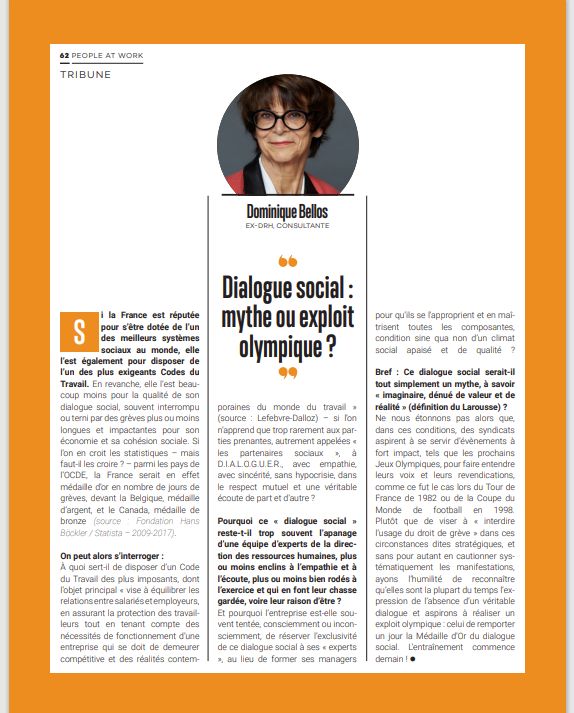Interview People at work #12
Social dialogue: myth or Olympic achievement?
France is renowned for having one of the best social systems in the world, as well as one of the most demanding labor codes. On the other hand, it is much less so for the quality of its social dialogue, often interrupted or tarnished by strikes of varying duration, which have a major impact on its economy and social cohesion. If the statistics are to be believed – but are they? – among OECD countries, France is the gold medallist in terms of the number of strike days, ahead of Belgium (silver) and Canada (bronze) (source: Hans bocker susta Foundation – 200#-2010).
This begs the question:
What is the point of having one of the most imposing Labor Codes, whose main purpose “is to balance relations between employees and employers, by ensuring the protection of workers while taking into account the operating requirements of a company that must remain competitive and the contemporary realities of the working world” (source: Lefebvre-Dalloz) – if stakeholders, otherwise known as “social partners”, are all too rarely taught to DIALOGUE, with empathy, sincerity, without hypocrisy, mutual respect and genuine listening on both sides?
Why does this “social dialogue” too often remain the prerogative of a team of experts in human resources management, more or less inclined to empathy and listening, more or less well-versed in the exercise, and who make it their preserve, or even their raison d’être?
And why is the company often tempted, consciously or unconsciously, to reserve the exclusivity of this social dialogue for its “experts”, instead of training its managers to take ownership of it and master all its components, a sine qua non condition for a calm, quality social climate?
In short: is social dialogue simply a myth, i.e. “Imaginary, devoid of value and reality” (Larousse definition)?
It should come as no surprise, then, that in these conditions, unions aspire to use high-impact events such as the forthcoming Olympic Games to make their voices and demands heard, as they did during the Tour de France in 1982 or the Football World Cup in 1998. Rather than aiming to “prohibit the use of the right to strike” in these so-called strategic circumstances, and without systematically endorsing such demonstrations, let us have the humility to recognize that they are most often the expression of the absence of genuine dialogue, and aspire to achieve an Olympic feat: that of one day winning the Gold Medal for social dialogue. Training starts tomorrow!
•

